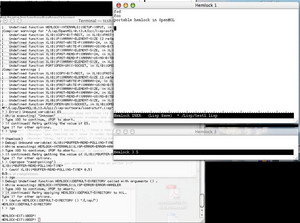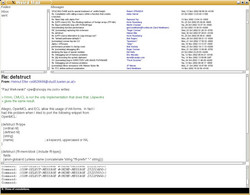February 28, 2003
February 27, 2003
DARPA Conference and Discussion
This weekend in LA, DARPA held a conference on their Grand Challenge autonomous ground vehicle race; wish I had known about it.
Gavin clued me in to the very active race discussion forum DARPA added.
February 26, 2003
SBCL 0.7.13
SBCL 0.7.13 is out. Dan Barlow says they've made it faster, fixed a lot of bugs, and added some nice extras, including a contrib system (with one contrib being a new interactive top-level similar to ACL's).
At the same time, there's a new port of CLX to SBCL, which even handles tunneling X connections over ssh.
Right now it looks like SBCL and OpenMCL (version 0.14 of which is currently in alpha) are neck and neck in the race to be the next lisp (after SCL) offering native threading under unix. And CMUCL 18e should be out any day now...
February 25, 2003
Corman Lisp 2.01
Roger Corman has announced Corman Lisp 2.01 [via chris double]. From the release notes, it looks like it fixes a lot of bugs and improves ANSI compliance.
Apparently the price went up to $249, but I'm not sure how much it used to cost.
Packed With Potential
PC Magazine gave the ER1 a 5-out-of-5 rating in its (surprisingly ok) robot feature.
I feel so mainstream.
February 24, 2003
New World Record
Paul Graham, replying to a message on ll1-discuss that mentioned Yahoo translating his lisp code to C++:
I should mention that they actually have just done this. A rewritten version (C++ and Perl) just launched in Jan. However,
(a) The reason they rewrote it was entirely that the current engineers didn't understand Lisp and were too afraid to learn it.
(b) The resulting program is a new world's record case of Greenspun's Tenth Rule. The Yahoo Store Editor called compile at runtime on s-expressions made on the fly. To translate this into C++ they literally had to write a Lisp interpreter.
(c) Even then, they had to drop some features (involving advanced uses of closures).
Whee!
Another message from Graham:
I believe the pointy-headed bosses were the driving force in the port. When I worked at Yahoo, management were nervous about the software being written in Lisp because they thought it would be hard to find programmers who knew it. Not so much that they couldn't find any, I think, but that because it was a comparatively rare skill, management would have less leverage over the hackers. When skills are not a commodity, employees aren't hot-swappable.
A friend of mine (who's probably on this list, actually) went to interview there in about 2000. He said they told him they didn't need Lisp hackers, because they were going to port the Store Editor to C++. Why? Because they didn't think they'd be able to find Lisp hackers.
BTW, I should add that most Y Store users still probably use the Lisp version at this point. They're doing a gradual rollout, and you have to explicitly choose to "upgrade" to the new version. The feature they had to take out because of closures is actually a fairly important one, so I suspect many users never will upgrade.
February 21, 2003
Rebuilding the Edinburgh AI Library
On December 7, 2002, The AI Library at Edinburgh University was severely damaged by a fire. Now they're trying to rebuild their collection, and they're asking for help.
February 20, 2003
Dynamic Demo
In c.l.l, Chris Beggy posted a link to his “Creating Dynamic Websites with Lisp and Apache” page, which both describes and itself demonstrates one way to make a database-backed web site in lisp.

Hotel rooftop in Merida, Mexico
The page uses what might look like a rather intimidating list of lisp libraries: mod_lisp, lml, cl-ppcre, clsql, uffi, and asdf (it's maybe worth noting that three of them were written by kmr). In reality, I think it's only about 20% as bad as it looks--You need lots of libraries for anything, right? And asdf sure seems to make it easy to install and load them.
I hadn't looked at any code that used mod_lisp before this; it looks a little low-level compared to portable allegroserve, but not too bad.
February 19, 2003
MCL Directory
The MCL software and consultant directory is up and running. There's a lot of software on the FTP site that isn't in the directory yet.
February 18, 2003
Lisp and XP Success
Kenneth Dickey on a successful software project [via CLiki]:
Imagine this. You need to build a complex, highly reliable software product that works at high speed on multiple networked server platforms and integrates with many kinds of server environments and databases. You have a working prototype but no production code and want product install CD-ROMs in under a year. The product is not totally defined, but you know that your business will change and you will have to feature evolve very fast in a highly competitive market. You are selling to Fortune 1000 companies, which demand 24/7 reliability.
And they did it in lisp.
This was the best code quality and the lowest development cost I have seen in 20 years of commercial software development.
Well, alright!
February 17, 2003
Nerds
Paul Graham, "Why Nerds Are Unpopluar" [via chrisb on #lisp].
My first year of middle school, I sat at an "E" table. That changed pretty quickly though--I bet not too many people can say their social standing actually improved when they started hanging out with the Dungeons and Dragons kids.
It's good, though--now that my fashion acumen and social adroitness have caught up to my staggering genius, my early experiences keep me humble.
February 16, 2003
Local Lisp
Spring fever? Whatever it is, lispers seem to have suddenly decided it's a good idea to gather in bars and pubs across the world for drinking, smoking, ogling and talking lisp. You know, the usual vices.
Dan Barlow has set up a section of the ALU website to coordinate these drunken lispfests. Currently there are pages for New York, the San Francisco Bay area, Seattle, London, Mumbai City and CERN.
February 15, 2003
WeirdMail
Jochen Schmidt has an "experimental and unfinished" mail client called WeirdMail, based on a POP3 framework he wrote.
Yeah, it's been a while since i caught up on comp.lang.lisp.
February 14, 2003
Sex + Violence
Last night I went to Lucha Vavoom, which is masked mexican wrestling (lucha libre) plus burlesque striptease. Plus midgets. Doing both.
Wish I'd brought my camera.
(This movie from last year's captures it pretty well, though.)
It was great (totally deck). And I ran into some interesting people.
February 13, 2003
CLAIM on SF
CLAIM has a new home at SourceForge. No big deal; I hack on it, Mike hacks on it (I/NET uses it as part of a network monitoring tool). We just wanted to keep it in sync.
February 12, 2003
Executable Design Patterns
Norvig's Design Patterns in Dynamic Programming slides have been around for a long time, but I had never heard of this follow-up paper from last year by Gregory Sullivan, "Advanced Programming Language Features for Executable Design Patterns". [via chris double.]
It's basically just a comparison of actual C++, Smalltalk and Lisp (well, scheme + object system) code for about two dozen of the patterns in the GoF book, mostly illustrating the point Norvig made. Nothing more, nothing less.
I stumbled onto this whole weird collection of people talking about this: James Robertson, Charles Cook, Ted Leung, Gordon Weakliem, Carlos Perez, and Chris Double.
When DNS Goes Bad
lemonodor's DNS was turned off today. I kind of assumed I'd get a notice from dotster when it was time to renew, but apparently not.
If you're reading this, then someone is probably caching DNS information longer than they should--lucky you. Name service should be restored soon, but in the meantime you can use http://heavymeta.dyndns.org/ to get here.
OpenMCL 0.13.4
OpenMCL releases keep slipping by me. 0.13.4 was released almost two weeks ago, and has some bug fixes.

Carl's hands at the Hideout, my second-favorite Chicago bar. Winter 2002.
February 11, 2003
Portable CLX
Yesterday Daniel Barlow alluded to the new mailing list he started with Gary Byers, portable-clx-devel.
My observation is that there are several different more-or-less actively maintained CLX ports and patches to ports around the net. You can see the mess of links on the CLiki CLX page, and that's just the free ones: who knows what Franz or Xanalys or Scieneer have in their internal systems?
The mailing list is an attempt to get the various CLX implementors and maintainers together, so everyone can more easily benefit from patches like the one to handle ssh-tunneled X connections.
AERCam Gets Some Notice
Space.com's article "Robotic Assistants Could Have Helped Columbia" talks mostly about AERCam. (It also mentions the PSA--someday maybe I'll show you some concept art for a very special PSA variant).
The article points out that inspecting the orbiter tiles isn't very helpful given that there is no on-orbit repair capability, though David Akin's idea of spraying emergency ablative material on tile gaps doesn't sound so far fetched.
Scheme Weekly News
In case you are into scheme, the scheme weekly news is "a round-up of news and announcements related to the Scheme programming language, mostly taken from newsgroups, mailing lists and web sites" [via gavin].
February 10, 2003
Portable Hemlock
Gilbert Baumann is working on making Hemlock, CMUCL's X-based emacs-like editor, portable to other lisps.

Screenshot of portable hemlock running in OpenMCL, by Rainer Joswig.
February 07, 2003
PPC Floating Point Compiler
Randall Beer has released a preliminary version of a floating point compiler for MCL and OpenMCL.
FPC-PPC compiles Lisp double-float expressions directly into PPC assembly language, producing code that is usually significantly faster and that allocates much less memory than the Lisp compiler.
For example, the following function takes about 370 ms to execute 100,000 times (on a 1GHz PowerBook G4; not including GC time) and allocates 14.4MB of memory on MCL 5.0b:
(defun euclidean-distance-3 (x1 y1 z1 x2 y2 z2) (let ((dx (- x1 x2)) (dy (- y1 y2)) (dz (- z1 z2))) (sqrt (+ (* dx dx) (* dy dy) (* dz dz)))))Using FPC-PPC, the following executes in just 33 ms and allocates *no* memory:
(define-double-function %euclidean-distance-3 (x1 y1 z1 x2 y2 z2) (let ((dx (- x1 x2)) (dy (- y1 y2)) (dz (- z1 z2))) (sqrt (+ (* dx dx) (* dy dy) (* dz dz)))))
February 05, 2003
Crab vs Pipe (With Robot)
Crab vs Pipe (With robot, oblivious to the crustaceaicide it has just been party to). [via caleb.]
A 2700 psi differential is nothing to mess with. It's probably even worse if you keep your skeleton inside your body.
My Other Car
...is a cdr. It's available for purchase, and it could actually look good on my black Beetle. [via will.]
February 04, 2003
Final MCL 5.0 Coming Soon
Digitool is reminding everyone that the final release of MCL 5.0 is coming soon. Once it's released, the price goes up to $750 (you can currently get the beta for $495 with a free upgrade to the final version).
February 03, 2003
ALU Awakes
It's finally happened: danb has unveiled the new ALU website.
It's a CLiki, which only seems right. And makes a lot of sense, as well.
February 02, 2003
STS-107
Each time I think it's an elaborate joke, until I see it on TV.
Robot wisdom has some good links.
I can only guess what effect this will have on the space station (which one AP story called Mir. Jesus.).
Coincidentally, several years ago Columbia flew the AERCam Sprint that was featured in in the first batch of lisp porn on lemonodor. Also coincidentally, Sprint was a remote-controlled free-flying robot camera meant to make it possible to inspect the exterior of the Shuttle and the space station without requiring astronauts to perform an EVA. (NASA has some videos of AERCam in action.)
Another coincidence: The first time I ever heard the term "software" was during the very first Shuttle launch attempt in 1981. The software on Columbia failed to synchronize with software on the ground or something. I was 10 years old and I remember how odd I thought the word sounded and what a strange concept it was. Little did I know.



